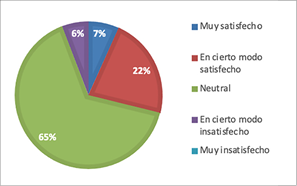120 | nº 31, pp. 107-129 | doxa.comunicación
July-December of 2020
European migrants on the Costa del Sol: an analysis of the consumption of foreign media by the German...
ISSN: 1696-019X / e-ISSN: 2386-3978
Image 4. Level of satisfaction with the German-language press produced on the Costa del Sol
Source: own elaboration
The large percentage of “neutrals” (65%) is interpreted in part as being due to the large amount of advertising these media have to include in order to survive. In the German SUR (Sur Deutsche Ausgabe), half of the content is informative and the other half is cultural, leisure and commercial advertising. It is understandable that no matter how interesting a newspaper is, German readers are not going to rate it very positively when half of its content is advertising, but neither do they rate it negatively, since some of the advertising is of particular interest to this group, as pointed out earlier. In fact, they are also asked about this specific aspect in the surveys and 70% say that the advertising in these media provides them with useful information.
The comments made by the focus group confirm this neutral assessment of the most widely read press, but also a more critical stance towards the other German-language media: “50% are translated, do not have much content and are not specifically addressed to Germans either” (Participant no.1, man, 48 years old). The local press for Germans therefore meets the definitions of service journalism in the sense indicated by Diezhandino (1993), which is essentially intended to provide practical information, but in no way promotes the integration of these people into Spanish society or, in a broader interpretation, European cohesion.
The personal comments in the surveys confirm that to inform themselves about Europe and the process of European construction, or about highly topical phenomena such as Brexit, German residents do not resort to the media published on the Costa del Sol in their own language, but continue to use the media from their country or the Spanish media, in the case of those who are fluent in Spanish:
As far as information is concerned, I get it from the Spanish press, also the German press, but more the Spanish, and the German press more on the Internet. Various media. (Participant no.2, woman, 57 years old).
I get my information from both the Spanish and the German press, and it’s really interesting, because they offer very different points of view and perspectives. (Participant no.1, man, 48 years old).
